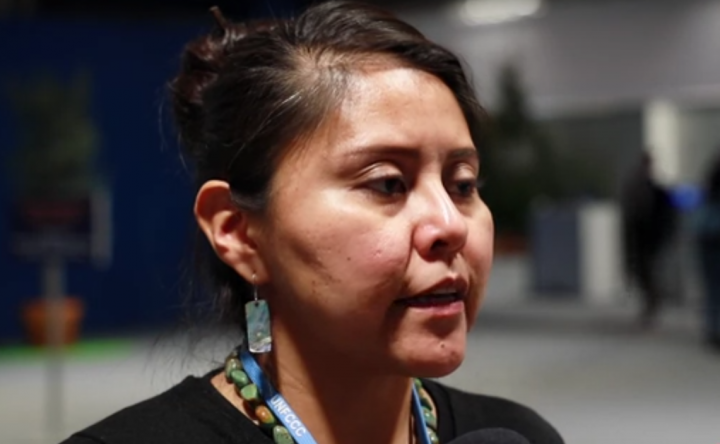Leona Morgan is part of the Nuclear Issue Study Group. A Navajo indigenous woman from New Mexico (USA), she has participated in the COP25 to denounce how their people and lands are being nuclearized for uranium mining -that threatens to be put into motion once again-, for the currently existing uranium plants, due to the effects of the nuclear tests carried out in 1945 and to the current facilities for weapon development … and for having become the “nuclear cemetery” of the United States.
Morgan claims that continuing to produce energy and nuclear waste is “a major human rights violation” and demands not to leave this legacy to future generations.
We thank Teresa Vicente Giménez for her collaboration in this interview.
Transcription
Hola! My name is Leona Morgan and I’m with the Nuclear Issue Study group.
Uranium mining takes place on indigenous lands
We are focusing on every aspect of the nuclear fuel chain in New Mexico. In the 1950s to the 70s there was a boom in uranium mining and that was used for military and the first atomic weapon was tested in New Mexico. The first nuclear weapon in the world was tested on July 16th 1945 in New Mexico, in my community. I am Diné or Navajo, I am indigenous to this area in the United States and there was a lot of uranium mining on our land that caused environmental problems and health problems, and this is the same all over the world that uranium mining is on indigenous lands, mostly, and is hurting our people because of the different cancers and other problems.
In New Mexico we have uranium mining from the past and they want to start again. We also have two nuclear research facilities, they are national research labs for weapons. We have the only enrichment facility in the whole country: it’s a uranium enrichment plant in the southeast and we have one of the only deep geological repositories in the world. There’s a waste facility for plutonium-contaminated waste in New Mexico and it’s the only one like it in the world. Now, we are being threatened by a new nuclear waste dump: there’s a company called Whole Tech International. Whole Tech wants to build a dump for the waste from all of the reactors in the United States, over 100 nuclear power reactors.
This is the same problem all over the world: there is no safe place to store the waste from reactors permanently. It’s a problem in many countries that they don’t have anywhere to put the waste.
Continuing to produce nuclear energy is a major human rights violation
We are here at the cop 25 to educate people and NGOs and our governments about the problem with nuclear energy, because some people think it’s good for the climate and we say that we need to stop investing in nuclear, because it’s very expensive and because of the problem with the waste and the contamination from radioactivity. It’s a huge human rights violator if we continue to produce nuclear energy and we have to stop making nuclear power.
The measurement of the carbon from nuclear is only at the power plant and the steam that comes out is is not carbon, so the industry and the government says nuclear is carbon free but they don’t count the mining and the processing and all of the steps before the power plant and they don’t count the waste storage after the power plant. So, it is very carbon intensive but that is not included when they count the carbon footprint of nuclear.
Nuclear energy impacts health. We must stop investing in it to protect future generations
I come from New Mexico but I also work nationally with groups in the United States, as well as some other NGOs internationally and this is why we say nuclear is not a solution to climate change. We say don’t nuke the climate. We have a website dontnuketheclimate.org. This is why I came here to Madrid, and I also visited Salamanca and Cuenca; these are places in Spain that are fighting uranium mining. In Salamanca and in Cuenca they also fought a nuclear waste dump successfully. I know there are seven nuclear reactors in Spain, and there is also a problem of where to put the waste. The number one thing to do is stop making more waste. We in the United States have some studies about the impacts from the uranium mining on women and children, and we find there’s a university that is studying this, the health problems, and they have found from the mining that happened 50 years ago there is still contamination and the babies being born today -some of the babies have uranium in their urine-. So, the old problem is still there and we need to clean up all of the contamination, stop nuclear power, and we need to work together to do this all around the world. We do this for the protection of our water and we say water is life and also for the protection of the future generations. Nuclear power makes climate change worse and we need to work together to stop investing in it and to stop making nuclear waste for our future generations.






